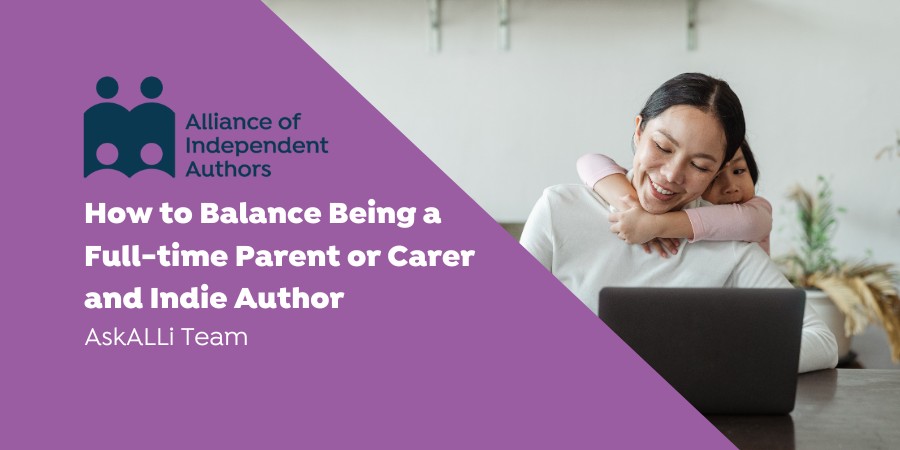Managing time when you're a creative is tricky at the best of times. Many of us have responsibilities outside our writing like jobs, parenting or caring duties. So how do you juggle it all in order to grow your business? Today, the Alliance of Independent Authors AskALLi team speaks to systems expert Katlyn Duncan all about how she does it.

Hybrid Author Katlyn Duncan
Managing Time
Katlyn Duncan is a multi-published author of adult and young adult fiction, and has ghostwritten over 40 novels for children and adults. Find out more about her on her YouTube channel.
Parenthood and authorship make for a challenging balancing act. The responsibilities and demands of both roles can leave most parents overwhelmed, overworked, and with little perceived room for personal growth and professional development.
But fear not! I’ve been in your shoes and I’m here to give you four actionable tips specifically designed for published authors who are also parents, providing strategies to achieve harmony between your writing career and parental responsibilities.
Purposefully Manage Your Time
Effective time management is crucial for author-parents seeking to strike a balance between their writing career and parenting responsibilities. While you don't need to become a professional bullet journaler overnight, it's essential to have a clear direction for each day.
Personally, I find it helpful to envision my life in different buckets. I have my Mom bucket, Author bucket, Job bucket, and so on.
To start your day on the right foot, take a moment to identify the most important tasks within each bucket. In the Mom bucket, you might have activities like preparing meals, helping with homework, or attending school events. In the Author bucket, you could have writing sessions, editing tasks, or marketing efforts.
Breaking down these tasks into manageable chunks is key. Rather than overwhelming yourself with a daunting to-do list, focus on smaller, achievable tasks. For instance, in your Author bucket, do you need to write 1,000 words today to stay within your goals? How about breaking that down into (4) 250 word chunks. Seems a bit more doable doesn’t it?
Once you have identified your tasks, allocate dedicated time slots for each activity. This can be as simple as blocking off specific hours on your calendar or setting reminders on your phone. Utilize productivity tools such as calendars (my favorite is Google Calendar), task management apps, or even good old-fashioned pen and paper to optimize your schedule and keep track of your progress.
Additionally, I have a free resource at the end of this article to get you started, so stay tuned.
Create A Support Network
Building a strong support network is invaluable for author-parents, not only to receive emotional support but also to combat the dreaded “comparisonitis” that often plagues us. Connecting with others who understand the unique challenges we face can be a game-changer. It's like finding a tribe that speaks the same language.
Don't underestimate the power of online communities. Join social media groups, forums, or even specific platforms dedicated to author-parents. These virtual spaces offer a wealth of experiences, advice, and camaraderie. Engage in discussions, ask questions, and be open to sharing your own experiences. You'll find that others are facing similar challenges and can offer valuable insights and support.
But let's not forget about our support network beyond the writing community. Enlisting the help of family members, friends, or trusted babysitters can be a game-changer. Don't be afraid to ask for occasional childcare to afford yourself dedicated writing time. Or hire a service to help alleviate the pressure of cleaning your space while you’re on a deadline.
Remember, it takes a village to thrive in both parenting and writing. Having a trusted support system in place allows you to focus on your writing without worrying about the well-being of your children. It's a win-win situation for everyone involved.
By actively seeking out and nurturing these support networks, you'll find yourself surrounded by people who understand and appreciate the unique challenges of being an author-parent. They will provide the emotional support you need, foster collaboration opportunities, and even open doors to new writing and parenting-related opportunities. Remember, you don't have to go through this journey alone. Embrace the power of community and watch how it propels you forward in both your writing and parenting endeavors.
Embrace Flexibility and Celebrate Small Wins
Flexibility is an essential quality for author-parents seeking to strike a balance between parenthood and authorship. Let's face it, parenting responsibilities have a way of throwing curveballs into even the most meticulously crafted writing schedules. But here's the key: rather than getting frustrated or discouraged, embrace the art of adaptation.
Accept that there will be days when your writing plans may need to take a backseat to the needs of your children. It's not a sign of failure; it's a reminder that being a present and attentive parent is just as important as pursuing your writing dreams. Embrace this mindset and let go of any guilt or frustration that may arise from the occasional disruptions.
Be open to finding alternative ways to accomplish your writing goals. Perhaps you can wake up a little earlier to squeeze in some writing time before the household wakes up, or take advantage of nap times or quiet evenings when your children are asleep. Embrace those unexpected pockets of time that present themselves throughout the day and use them to your advantage.
It’s also important to maintain a positive mindset throughout this process. Progress comes in various forms and sizes.
Celebrate the small wins along the way. Completing a chapter, even if it takes longer than expected, is an achievement to be proud of. Brainstorming ideas during playtime or jotting down a few sentences amidst the chaos are all steps forward on your writing journey. Recognize and acknowledge these milestones, no matter how seemingly insignificant. Each small win builds momentum and keeps your motivation alive.
I always believe in treating yourself to a reward after accomplishing a writing-related task or reaching a mini-goal. This could be your favorite drink at a local coffee shop, reading a book that’s been sitting on your TBR for way too long, or even giving yourself a well-deserved night off.
No matter what you’ve accomplished, celebrate often and you will be so proud of the results.
Prioritize Self-Care
Self-care is not a luxury but a necessity for author-parents in order to maintain overall well-being and creative energy. It's crucial to carve out dedicated time for yourself each day, even if it's just a few minutes. Prioritize activities that rejuvenate and recharge you, whether it's engaging in regular exercise, practicing meditation for a few moments of mindfulness, or pursuing a hobby that brings you joy and relaxation.
Sometimes as author-parents, we may feel guilty or selfish for prioritizing our own needs. However, it's important to remember that self-care is not a detriment to our parenting or writing responsibilities. It is an investment in our ability to show up as the best versions of ourselves in both roles. When we take care of our physical, emotional, and mental well-being, we have more energy, focus, and creativity to dedicate to our children and our writing.
Remember, self-care is not a one-time event but an ongoing practice. Make it a non-negotiable part of your daily routine. Block off time on your calendar or set reminders to ensure that you honor these moments for yourself. Communicate your needs with your family and establish boundaries that allow you to prioritize self-care without guilt or interruptions.
My favorite way to do this (as I often suffer from decision-fatigue when I need self-care the most) is by creating a self-care menu.
Start by identifying self-care activities that bring joy and relaxation and categorize them based on time. You can personalize and experiment with activities that rejuvenate you, ensuring your self-care menu reflects your unique needs.
When you are feeling stressed out about personal or professional issues, choose an item from that menu that aligns with the time you have available. Whether it's a quick five-minute breathing exercise, a 20-minute walk in nature, or an hour of dedicated reading time, having a self-care menu makes it easier to prioritize self-care in the moment.
By regularly practicing self-care, you not only recharge your own batteries but also set a positive example for your children. They learn the importance of self-care and witness firsthand the benefits it brings to your overall well-being. It's a powerful way to teach them about balance and self-nurturing.
Balancing the roles of an author and a parent is no easy feat, and the journey is filled with unique challenges and moments of triumph. As author-parents, we understand the constant juggling act, the occasional sacrifices, and the deep desire to excel in both realms.
Remember, you are not alone in this beautiful, messy adventure.
Embrace the power of self-care, cultivating a strong support network, celebrating each small win, and adapting along the way.
Also, cherish the moments of joy and the incredible gift of parenthood. With patience, perseverance, and a kind dose of self-compassion, you can navigate the complexities of authorship and parenting allowing you to shine in both roles.
Trust yourself, embrace the journey, and believe in your ability to thrive as a dedicated parent and a successful author. You've got this!
If you want an actionable guide on setting up your time strategically, I have a free PDF resource called “Mastering Publishing and Motherhood,” which you can find here. You can also stay connected with me by subscribing to my YouTube channel, where I regularly share valuable content related to parenting and writing.
Finding More Time
Here are some of the AskALLi teams top tips for finding more time.
If you have young children, leverage their nap time. Naps are your chance to write not do housework. And while we're talking about housework, cut yourself some slack. Who are the standards you're maintaining for? If you can't outsource the cleaning, find good short cuts. Think about food delivery services, fresh food services like HelloFresh or Gousto.
Include your children too. Go on ‘artist's dates' with your kids to fill up your own creative well. Most of the time these creative dates will fascinate children too. ALLi Blog Manager Sacha Black says,
“One of the artist dates I love doing is going to old British castles or stately homes. They're a great day out for everyone because the kiddo can run around, we can all have a picnic and then I get to wander ancient halls filling my inspiration well.”

Parenting and Writing: Mona Marple
The AskALLi team spoke to another member, Mona Marple about how she manages authoring and mom life.
Mona Marple is a cozy mystery author who lives in Nottinghamshire, England with her husband, daughter and pampered Labradoodle. When she isn’t writing about killing people, she’s probably reading about it instead.
Find out more about Mona on her website.
Q. Can you tell us about your writing business?
I’m a cozy mystery author, with 20+ books out. I juggle my writing with running a niche law practice and raising my daughter, who has additional needs. I’m very blessed to have an amazing assistant, and I also outsource my cover design and the formatting and uploading of my files to IngramSpark.
Q. What are the biggest blockers or barriers you face as a parent/carer?
Time! Essentially, I’m running two businesses in school hours and term time, which is a challenge.
Typically, I have six weeks of term time and then a school holiday, which can make consistency an issue. It can feel as if I’m constantly adapting to a change in routine and when I get settled into one, things change again.
As a parent of a child with additional needs, I can’t make use of school holiday clubs and regular childcare, so my options to increase my worktime are fairly limited.
Q. How do you get around those challenges?
I am an obsessive planner and everything has to be written down. A lot of my tasks repeat every week or month, and I use Todoist for these recurring tasks so there’s no chance of me forgetting to add the next time they are due. I still use a paper planner as well, and that’s where I log what I’ve done each day.
I also work well to a deadline, so I tend to set books for pre-order before I’ve even got a blurb figured out for them. The deadline motivates me, but I know it wouldn’t work well for everyone.
I think generally, making the best use of the time I have available is vital. Actual writing time is precious and needs to be scheduled and protected. Writing sprints really help me maximise my writing output. Other tasks such as scheduling newsletters and replying to eMails are easier to pick up in an evening while watching TV, so they don’t get done in that focus time.
I also outsource as much as I can. My assistant is invaluable. Outsourcing in my personal life is a big help too. I don’t mind admitting that I have a regular house cleaner, a gardener, and a dog walker. These people allow me to spend that limited focus time on my priorities – and it creates jobs for people who want to do those things!
Another important thing, and I’m reminding myself of this constantly, is to try and limit comparisonitis. I’m not writing full-time, and since I enjoy my law work, I will probably never write full-time. My daughter’s additional needs mean that she requires more focused attention and supervision, and that also affects the time I have available. I have to remember these things and resist the temptation to match the output of full-time, child-free authors.
Q. Do you have any tips or advice or planning techniques you think are helpful for other parent/carers?
As disheartening as it might sound, I think accepting the time you have available will save a lot of heartache in the long run.
As well as that, ask for help. You don’t have to do everything yourself, either at home or in your author business. There are people out there who will help with things.
I’d end by urging people to recognise their limits and prioritise self-care. Giving up sleep may be a great way to boost your productivity short-term, but long-term it’s probably going to lead you into burnout. It is possible to have a successful and fulfilling author career as a parent, but your journey and your individual mountain you are climbing may look different to other people’s. That’s actually kind of a beautiful thing.





I don’t know what rabbit hole you emerged from or what you were aiming for, but whatever it was you missed completely. Your so-called advice was beyond condescending. I read this article looking for writing and time management advice. Instead I got a hen party. No, thank you
You have made it clear that we who are CARERS for their elderly parents do not count.
ALLI, you are not an ally. You are the problem.
Wrong title. It should read ‘Carers of Young Children’. When you are caring for adults, who do not have school times etc to plan round, things are more difficult. When you are caring for someone in the same house 24/7, whether adult offspring with special needs or a parent with an illness like dementia, you cannot plan more than minute to minute. You can HOPE to have a few minutes free at a specific time, but that is all. The person you are caring for may go to some form of day care or club, but they may not. If you are very lucky, you might have someone who will come in and take over for an hour or two while you can go and write in a cafe or car, but few of us even have that option. With children, you can usually get away with saying things like ‘Give me a moment to finish this sentance’, but with adults, this can lead to tantrums. Adults are bigger than children and can do greater harm to themselves and others, leaving aside damage to property! Here in Scotland local authorities have to assess unpaid carers’ needs, but they do not have to provide what has been assessed. I you want to know how it really is for those of us in that position, read Sarah Norquoy’s book Salt on My Skin.